Iranian pop music or Persian pop music refers to pop music originated in Iran, with songs mainly in Persian and other regional Persian dialects of the country and region.
Iranian rock refers to rock music produced by Iranian artists. Rock music has been popular in Iran since 1960s, with the emergence of singers such as Kourosh Yaghmaei, Farhad Mehrad, Fereydoon Foroughi and Habib Mohebian, but was largely forgotten after the Iranian Revolution. Like most rock styles, electric guitar and bass guitar and drums are the main instruments in this type of music. In some groups, keyboard and piano are very important.

Kayvan Mirhadi is an Iranian guitarist, composer, conductor and music educator.

Mohsen Chavoshi Hosseini is an Iranian musician, singer, record producer and songwriter, based in Tehran. He has released ten albums, including a soundtrack to the 2007 film Santouri.
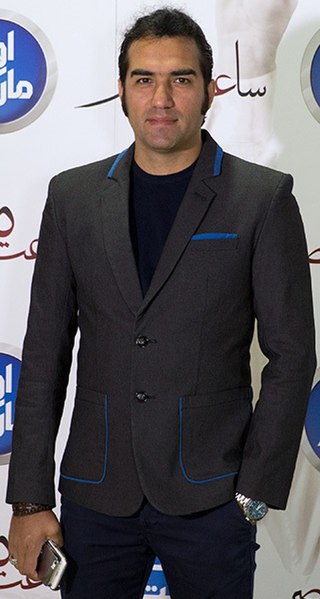
Reza Yazdani is an Iranian singer, musician, composer and actor. He is an Iranian pop-rock musician and has released twelve official albums and numerous singles. His main instrument is guitar, especially electric guitar. He has performed live concerts since the release of his third album, Hiss, mainly in Milad Tower Concert Hall. His first album is called Shahre Del in which all the lyrics were from Rumi poems.

Mohammad Reza Azadehfar, professor in ethnomusicology and santūr performer, was born in 1969 in Isfahan, the Safavid capital of Iran. He started learning the Iranian traditional dulcimer (santūr) under the supervision of Sa’id Na’imimanesh in 1981 and spent some 4 years at the Conservatory of Isfahan. In 1988 he moved to Tehran and attended classes in the santūr given by Faramarz Payvar and Sa’id Sabet.
The National Festival of Youth Music, is a music festival in Iran that highlights Iranian music performed by young musicians.

Mehdi Yarrahi is an Iranian singer, musician, and activist living in Tehran. He began his professional career in 2010. At times, he has been banned from performing in public by the Ministry of Culture and Islamic Guidance and the Islamic Republic of Iran Broadcasting due to the politically sensitive content of his songs and protests.
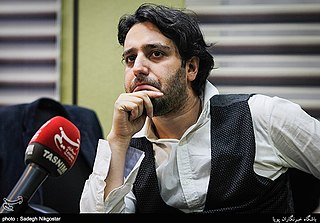
Kaveh Afagh is an Iranian singer, songwriter, arranger, guitarist as well as an actor and painter.

Sanam Pasha is an Iranian songwriter, vocalist and vocal coach in rock and metal music. As a child, she learned Persian folk music and later went on to learn classical piano, vocals, and solfeggio. She also has an online Masters's certificate in Songwriting and Vocals from the Berklee College of Music. She founded Sanam Pasha, an all-female rock band, in 2012.
Soroush Omoumi, is an Iranian flutist, drummer, percussionist, arranger, and composer.
Negin Zomorodi is an Iranian composer and pianist.
Idin Samimi Mofakham is an Iranian composer born in 1982.

Hoshyar Khayam is a British-born Iranian music performer, composer, and teacher. He lives in Tehran.

Shahin Farhat is an Iranian musician, composer and music teacher. As one of the most famous composers of classical music in Iran, he has created numerous works based on common forms in Western music, such as: symphony, concerto, suite, cantata, prelude, fugue, symphonic poem, rhapsody and other traditional methods, which often add space. Romantic music is near and at the same time it has not been without the influence of Iranian music. About twenty symphonies of his works have been recorded and published so far, which is the most numerous among the works of Iranian composers, which is why he is referred to as the "Father of the Iranian Symphony".
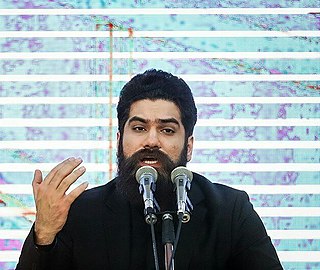
Ali Zand Vakili is an Iranian singer, composer, and music teacher. He began his artistic career in music as a child by singing and playing the tonbak. In 1998, after the establishment of Shiraz Music Conservatory, he was one of its first entrants. After studying at Shiraz Music Conservatory for three years and learning santour, piano and tonbak in 2002, he entered Tehran Conservatory of Music and graduated from there. He went on to read the piece and a few years later became famous with the release of the lullaby piece. Zandukili is currently a music expert.
Behrouz Saffarian is an Iranian composer, arranger, and producer. Saffarian was named in the top ten in both the composer and arranger sections in the poll of the best Iranian pop music of 1991 by Taranehmah magazine. Saffarian activity dates back to 1997.

Barbad Award is a statue awarded to the winners of the competitive section of Iran's most prestigious music festival, the Fajr International Music Festival. This award was added to the festival from the 31st Fajr International Music Festival.
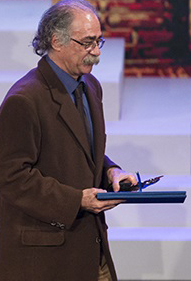
Arsad Tahmasbi is an Iranian musician, composer, radif-preserver, researcher, teacher, and Tar and Setar instrumentalist.
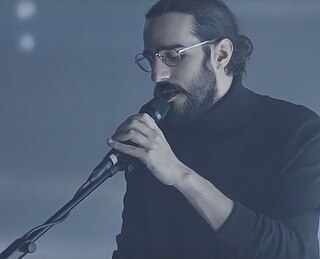
Kian Pourtorab ; is a singer, songwriter, composer and musician from Iran. He is also known as the founder and lead singer of Comment Band, an alternative rock band in Iran. The band stopped activities in 2016 and Pourtorab pursued his career as a solo artist. He has since released several solo albums including “This Side (2018)”, “Q (2021)”, ”Shabgard (2022)” along with multiple solo singles such as “Delsard”, “Ye Khabeh, Na Bishtar”, and “Bord o Bakht”.













